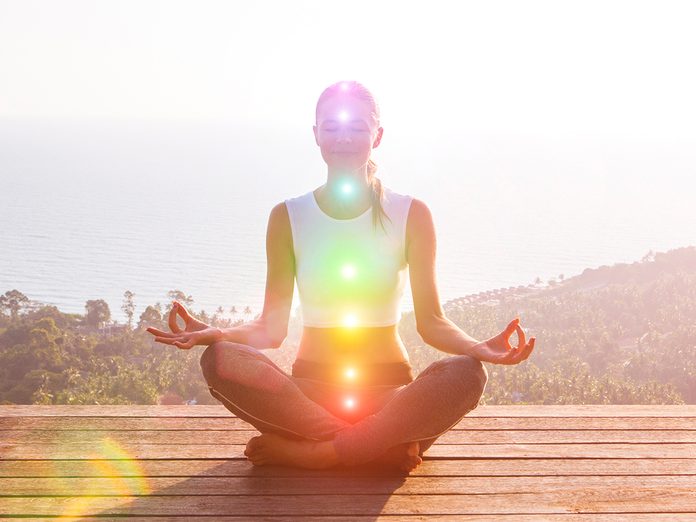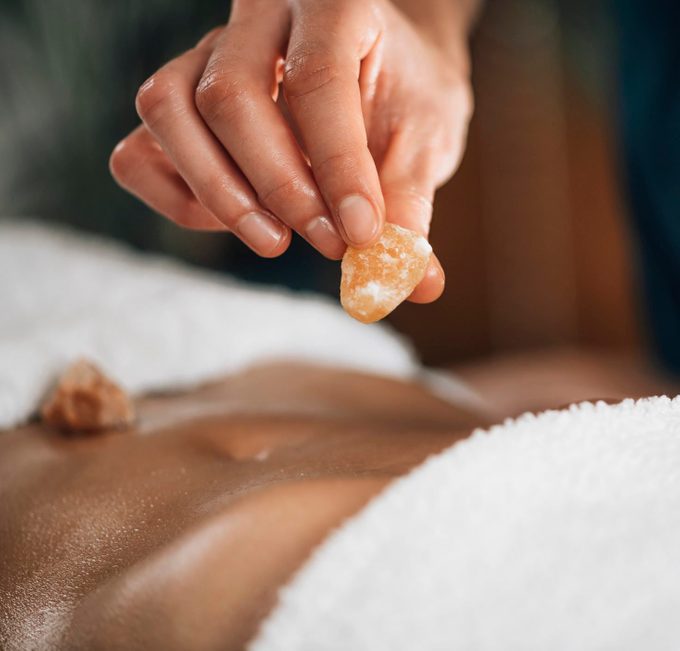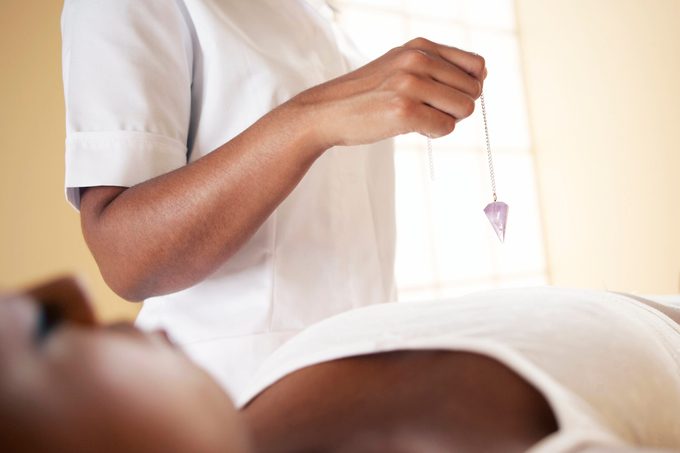What Are Chakras? Everything You Need to Know About Healing Energy

Energy healing may have a positive effect on your mental, emotional, and physical health. We asked experts where the seven chakras are located, the chakra colorus and stones, and how to unblock chakras.
Going through a divorce can be challenging, so when Gwyneth Paltrow announced in 2014 that she was “consciously uncoupling” from her then-husband Chris Martin, many watched to see what the actress and CEO of wellness brand Goop would do. One of her many coping mechanisms: balancing her chakras through an energy healer. She was such a fan that she made energy healing the subject of the fifth episode of her Netflix show The Goop Lab, filming herself and several friends undergoing chakra therapy.
Many health experts say this type of therapy is no better than a placebo but there is some scientific and spiritual support for energy healing. Whether the results are due to the placebo effect, the relaxing nature of the treatments, or your chi (life energy force) getting realigned, it’s worth knowing more about it. So, we asked experts to explain chakras, how to unblock them, and whether they can affect your physical, mental, and emotional state.
What are chakras?
Chakras, as described by Hindu spiritual tradition, are the energy centres within your energy field, or “aura.” They are located throughout the body, forming a line from the base of your tailbone to the top of your head. The actual number varies between different energy theories, but there are seven main chakras. Each chakra is associated with a different part of the body and has both mental and physical attributes.
Chakra is a Sanskrit word that means “wheel,” and they are often described as spinning wheels of energy, says Jessie Quinn, Reiki master and founder of Moodrie, an online space for well-being with a focus on Reiki, a type of energy healing. Each “wheel” vibrates at a certain frequency and channels energy from the universe into the body.
Although they originated thousands of years ago in India, other cultures use chakra-type healing therapies, says Elizabeth Trattner, doctor of traditional Chinese and integrative medicine, certified acupuncturist, and advanced crystal healer. Ayurvedic chakras are very similar to the energy meridians used in traditional Chinese medicine, and similar concepts are also found in Hawaiian, Native American, and First People cultures. “The chakra model is an easy way for people to understand and visualize what’s going on inside their bodies,” Trattner says.
Are chakras real?
It depends on what you mean by “real,” says Shamini Jain, clinical psychologist and assistant professor in the department of psychiatry at the University of California, San Diego. Jain has done extensive research into biofield therapies, or noninvasive therapies focusing on a person’s energy field to promote healing.
Are they a physical thing you could find on an X-ray or in an autopsy? No, she says. But there is evidence to support the theory of energy healing, including chakras, she explains. The evidence is both traditional and scientific. “To date, there are no reliable ways to measure the chakra, but even though the chakras cannot be measured directly, cultures for thousands of years have been working with the energy system to foster health,” Jain says. “There is also much scientific research that has been done on how energy healers use the chakras to foster healing in another person with demonstrated [positive] effects on pain, anxiety, and even immune and hormone function.”
(Related: 10 Ways to Get Rid of Negative Energy)
What the science says
Jain and her team did a meta-analysis of 66 clinical studies of biofield therapies, including energy therapies like Reiki and healing touch. Her study, published in the International Journal of Behavioral Medicine, found that these therapies showed strong evidence for reducing pain in people with pain disorders, moderate evidence for reducing anxiety in hospitalized populations, and moderate evidence for reducing negative behavior symptoms in dementia.
Some of the positive effects may be due to the placebo effect. Patients showed just as much improvement after a “sham” Reiki treatment (performed by an untrained actor) as they did after being treated by a trained practitioner, according to a study published in Oncology Nursing Forum. Researchers gave both types of treatment to cancer patients as a way to help them recover from chemotherapy. They concluded that the positive changes were likely due to the one-on-one interaction with a caregiver rather than the energy healing.
Energy healing treatments are often very relaxing, which can decrease stress and increase feelings of well-being and comfort, independent of chakras. However, Jain says that it doesn’t have to be either science or spirituality. Practitioners can use both, together, to heal patients. The mind, the body, and the spirit are all interconnected, she says, so what affects one will affect the others.
How your chakras affect your health
Chakras, or at least your belief in them, can have a positive or negative impact. Each chakra is associated with different organs in the body and different mood states, says Trattner. Understanding your chakras can give you insight into mental and physical health problems, particularly ones that recur or are chronic, she explains.
Some experts say that trauma affects your energy and is stored within your chakras, which can then affect that part of your body. Nutrition can also affect your chakras. The “integral physiology” paradigm, as outlined in The Scientific Basis of Integrative Medicine, says that the chakras are energy transducers for subtle energy. Subtle energy, culled from the environment, is a healing energy that anyone can learn to perceive and utilize, and it is a crucial, but often missing, a component in health care.
This model says that working with your chakras can help you identify health problems and can also help you treat them.
Energy therapy and chronic mental and physical conditions
Treating health conditions with energy therapies may help improve your overall health and certain chronic mental and physical conditions—particularly when used in conjunction with traditional medical therapies, says Tara Salay, a physical therapist at New Dimensions Physical Therapy in New York City.
Salay became a registered yoga teacher and energy healer after discovering that medical treatments weren’t enough for some of her patients, particularly those who had chronic pain. Energy treatments don’t replace medical treatments; they complement them, she says. “I honestly believe this is the missing piece for many people dealing with chronic conditions. The brain may continually send pain signals even when there is no longer a ‘threat’ to the body,” Salay says. “If you can’t find a physical cause for your issue, it may be happening on an energetic level.”
At the very least, it won’t do any harm and it’s worth a try, particularly if you’ve exhausted other options. “Right now many people are deeply searching for alternative ways of healing our bodies and understanding how they work. Understanding chakras is a part of this,” Trattner says. “It’s harmless compared to Western options.”

What are blocked chakras?
If you’ve ever had a conversation with someone about their chakras, it’s likely included something about them needing to be realigned. You may have even been told that your chakra is “blocked.” What does that even mean? It’s a popular term but it’s a bit of a misnomer, Quinn says. “Because chakras are connected to energy, a ‘blocked’ chakra is really a chakra that is out of alignment,” she explains. This may manifest as a physical problem, like stomach pain, but it more frequently shows on an emotional level.
For instance, if you have a lot of hang-ups around self-confidence, personal power, and self-discipline, it may be that your solar plexus chakra is out of balance, as those qualities are connected to this energy center in your chest, she says.
How to align a chakra
There are many different methods for getting a chakra back into alignment, so you can find one that works best for you, Quinn says.
Energy healing
Reiki is a Japanese form of alternative medicine devoted to healing the body’s energy flows. A Reiki practitioner can help identify which chakra is blocked and can realign it, Quinn says.
Yoga
Yoga is good for your body and soul, and doing yoga on a regular basis is a great way to keep your chakras clear and open, Salay says. Many poses are specifically designed to target certain chakras.
Crystal healing
Some energy healers use specific types of crystals and stones to align each chakra. Our bodies vibrate at a certain frequency while crystals are stable, so they can help bring chakras back into balance, Trattner says.
Colour immersion
Each chakra is associated with a particular color that vibrates with the same energy. Surrounding yourself with the colour of the misaligned chakra can help bring it back into balance, Quinn says. If you think your solar plexus chakra is blocked, try wearing yellow, keep yellow crystals near you, eat more yellow foods, take a mustard bath, and sit in the sunlight, she says.
Chakra-specific meditation
Meditation in general has many positive health benefits, but there are guided meditations designed specifically to unblock or realign each chakra.
Affirmations
You are the boss of your mind and saying, thinking, or writing affirmations—short, positive statements—can help bring your thoughts into balance with your energy, Quinn says. Following the solar plexus example, you could choose affirmations related to personal power and confidence.
Temporary tattoos
“This is a little more on the woo-woo side of the spectrum, but some people like to balance their chakras using chakra boosters,” Quinn says. These temporary tattoos, which you place over one or more chakras, are designed to boost and balance your energy while you’re wearing them.
Keeping your chakras healthy
Want to keep your chakras from getting blocked in the first place? “Doing some routine upkeep on your chakras can be beneficial, especially if you have a chakra that has been out of balance before,” Quinn says. There is no one-size-fits-all method for taking care of your chakras, so she’s provided recommendations (below) for keeping each chakra healthy and in check.
The seven chakras
Each chakra is associated with an area of the body, a colour, an acupuncture point, crystals, and particular mood characteristics. Our experts also recommend a yoga pose designed to help align that particular chakra if you feel like it’s blocked.
Root chakra (Muladhara)
This is associated with your sense of security, especially as it relates to basic needs and survival.
Location: The base of your spine
Colour: Red
Crystal: Blackstones, like hematite and obsidian
Yoga pose: Easy pose or any pose that keeps you connected to the ground
Nurture it: Ground yourself using a grounding meditation, eating more root vegetables, or by “earthing” (walking barefoot on the grass) every day. This is especially important if your work or life feels uprooted, you live in a high-rise building, you are around a lot of people, or you travel frequently.
Sacral chakra (Svadhishthana)
This chakra is connected to your sense of creativity and is the seat of your emotions. It also is linked to desire and sexuality.
Location: Under your belly button
Colour: Orange
Crystal: Carnelian and aragonite
Yoga pose: Goddess pose helps you connect with deep feelings
Nurture it: Do something creative each day, like painting, writing, or dancing.
Solar plexus chakra (Manipura)
This represents your personal power, self-esteem, and confidence.
Location: Above your belly button
Colour: Yellow
Crystal: Citrine
Yoga pose: Warrior I pose aligns your center chakra in a powerful stance
Nurture it: Daily affirmations centered around power and self-love are Quinn’s go-to. It’s also important to get a daily dose of sunshine, preferably outdoors, in the morning.
Heart chakra (Anahata)
Not surprisingly, your heart chakra connects to your sense of love, empathy, and compassion for yourself and others.
Location: At the center of your chest
Colours: Green, pink
Crystal: Rose quartz, watermelon tourmaline, aventurine
Yoga pose: Upward-facing dog is great beginner “heart opener” posture
Nurture it: Surround yourself with greenery, like house plants, do breathing exercises, and eat leafy greens.
Throat chakra (Vishuddha)
The throat chakra is your power of communication, specifically around speaking your truth.
Location: At your neck
Colour: Blue
Crystal: Aquamarine, blue aragonite
Yoga pose: Lion’s breath breathing posture will stimulate your throat and neck
Nurture it: “The throat chakra is tricky, especially for women since it is related to speaking our truth,” Quinn says. This is why it’s especially important for women to practice chanting or singing every day. Neck stretches can also help.
Third eye chakra (Ajna)
The third eye chakra represents wisdom and is also where your intuition and intuitive abilities live.
Location: Center of your forehead
Colour: Purple
Crystal: Amethyst, kunzite lepidolite
Yoga pose: Child’s pose will help you turn your energy inward
Nurture it: Sleep is very important for your third eye, so the best thing you can do to care for this chakra is to get plenty of high-quality sleep every night.
Crown chakra (Sahasrara)
The crown chakra brings out your divine knowledge and spirituality.
Location: Top of your head
Colour: Violet, white
Crystal: Clear quartz, apophyllite, selenite
Yoga pose: Headstand is one of the most effective crown poses, but if that’s too difficult you can achieve the same result lying on your back with corpse pose, or savasana.
Nurture it: Take a warm bath and add a few drops of frankincense, an essential oil purported to balance crown energy. Aromatherapy can have healing benefits.
Now that you know about chakras and the importance of checking in with yourself, see our beginner’s guide to meditation.





